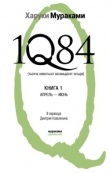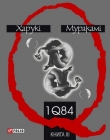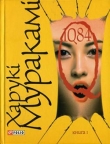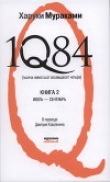
Текст книги "1q84"
Автор книги: Haruki Murakami
Жанр:
Современная проза
сообщить о нарушении
Текущая страница: 46 (всего у книги 81 страниц)
CHAPTER 19
Aomame
WHEN THE DOHTA WAKES UP
Air Chrysalis was a fantastical story, but it took the form of a very readable novella narrated from beginning to end in a simple, colloquial style, by a ten-year-old girl. It was not overly complex in terms of its vocabulary or logic, and it did not contain long-winded explanations or wordy expressions. The words and style of the young narrator were universally appealing—concise and, in most cases, pleasant—but they explained almost nothing about the events that unfolded. Rather, the girl simply let the narrative flow as she recounted what she had seen with her own eyes, never stopping to consider “What is going on here?” or “What could this mean?” The book moved forward at an easy pace appropriate to the story she was telling. Her readers followed along, very naturally adopting her point of view, and before they knew it, they were in another world—a world that was not this world, a world in which the Little People made air chrysalises.
Reading the first ten pages, Aomame felt herself responding strongly to the novel’s style. If indeed this was Tengo’s creation, he was certainly a talented writer. The Tengo that Aomame knew was primarily a mathematical genius. He was said to be a prodigy, easily able to solve mathematical problems that were too difficult for most adults. His grades had been outstanding in other subjects, too, if not quite up to his work in mathematics. He was also physically big and an all-around athlete, but Aomame did not recall anything about his being an especially good writer. Probably that talent was obscured at the time in the shadow of his mathematics.
On the other hand, Tengo might have done nothing more than transfer the author’s narrative voice to the page just as he had initially read it. His own originality might not have contributed much of anything to the style. She felt, though, that this was not the case. While the writing was deceptively simple, a closer read revealed that it was in fact calculated and arranged with great care. No part of it was overwritten, but at the same time it had everything it needed. Figurative expressions were kept to a minimum, but the descriptions were still vivid and richly colored. Above all, the style had a wonderfully musical quality. Even without reading it aloud, the reader could recognize its deep sonority. This was not writing that flowed naturally from the pen of a seventeen-year-old girl.
Having ascertained all this, Aomame proceeded to read the rest with great care.
The heroine is a young girl. She belongs to a small mountain community known as the “Gathering.” Her mother and father live a communal life in the Gathering. She has no brothers or sisters. Because she was brought here shortly after her birth, the girl has virtually no knowledge of the outside world. All three members of the family have busy schedules that give them little opportunity to spend time together in relaxed conversation, but still they are close. The girl spends her days in the local elementary school while her parents are primarily engaged in farm work. The children also help with the farming when they have free time.
The adults of the Gathering all hate the outside world. At every opportunity, they like to say that the world in which they live is a beautiful, solitary island floating in a sea of “cap-i-tal-izum,” a “for-tress.” The girl does not know what they mean by “cap-i-tal-izum” (or the other word they sometimes use, “ma-teer-ee-al-izum”), but, judging from the scornful tone they use whenever they speak the words, cap-i-tal-izum and ma-teer-ee-al-izum must be very twisted things that are opposed to nature and rightness. The girl has been taught that, in order to keep her body and her thoughts clean, she must limit her contact with the outside world. Otherwise, her mind will become “po-loo-ted.”
The Gathering is composed of some fifty relatively young men and women, divided into two groups. One group aims at “rev-a-loo-shun,” while the other group aims at “peese.” The girl’s parents tend to belong to the “peese” group. Her father is the oldest member of that group, and he has played a central role since the founding of the Gathering.
The ten-year-old girl cannot, of course, give a logical explanation of the opposition of the two groups, nor does she understand the difference between “rev-a-loo-shun” and “peese.” She has only the vague impression that “rev-a-loo-shun” is a kind of pointed way of thinking, while “peese” has a rather more rounded shape. Each “way of thinking” has its own shape and color, which wax and wane like the moon. That is about all she understands.
The girl does not know much about how the Gathering came into being, either. She has been told that, almost ten years earlier, just after she was born, there was a big movement in society, and people stopped living in the city and came out to an isolated village in the mountains. She does not know much about the city. She has never ridden on a subway or taken an elevator. She has never seen a building with more than three stories. There is just too much she doesn’t know about. All she can understand are the things around her that she can see and touch.
Still, the girl’s low-angled line of vision and unadorned narrative voice vividly and naturally depict the small community called the Gathering, its makeup and scenery, and the customs and ways of thinking of the people who live there.
Despite the split in the residents’ ways of thinking, their sense of solidarity is strong. They share the conviction that it is good to live separately from “cap-i-tal-izum,” and they are well aware that even though the shape and color of their ways of thinking may differ, they have to stand together if they hope to survive. They are barely able to make ends meet. People work hard every day without a break. They grow vegetables, barter with the neighboring villages, sell their surplus products, avoid the use of mass-produced items as much as possible, and generally spend their lives in nature. When they must use an electrical appliance, they find one in a pile of discards somewhere and repair it. Almost all the clothes they wear are used items sent to them from somewhere else.
Some members of the community, unable to adapt to this pure but difficult life, eventually leave the Gathering, but others come to join it. New members outnumber those who leave, and so the Gathering’s population gradually increases. This is a welcome trend. The abandoned village in which they make their life has many homes that can be lived in with a few repairs, and many fields remaining that can be farmed. The community is delighted to have new workers.
The number of children in the community varies between eight and ten. Most of the children were born in the Gathering. The eldest child is the heroine of the story, the girl. The children attend a local elementary school, walking together to and from the school each day. They are required by law to attend a school in the district, and the Gathering’s founders believe that preserving good relations with the people of the district is indispensable to the survival of the community. The local children, however, are unnerved by the children of the Gathering, and they either avoid them or bully them, as a result of which the Gathering children move as one. They stay together to protect themselves, both from physical harm and from “po-loo-shun” of the mind.
Quite separate from the district public school, the Gathering has its own school, and members take turns teaching the children. This is not a great burden, since most of the members are highly educated, and several of them hold teaching certificates. They make their own textbooks and teach the children basic reading, writing, and arithmetic. They also teach the basics of chemistry, physics, physiology, biology, and the workings of the outside world. The world has two systems, “cap-i-tal-izum” and “com-yoon-izum,” that hate each other. Both systems, though, have big problems, so the world is generally moving in a direction that is not good. “Com-yoon-izum” was originally an outstanding ideology with high ideals, but it was twisted out of shape by “self-serving politicians.” The girl was shown a photograph of one of the “self-serving politicians.” With his big nose and big, black beard, the man made her think of the king of the devils.
There is no television in the Gathering, and listening to the radio is not allowed except on special occasions. Newspapers and magazines are also limited. News that is considered necessary is reported orally during dinner at the Assembly Hall. The people respond to each item of news with cheers or groans—far more often with groans. This is the girl’s only experience of media. She has never seen a movie. She has never read a cartoon. She is only allowed to listen to classical music. There is a stereo set in the Assembly Hall and lots of records that someone probably brought in as a single collection. During free moments, it is possible to listen to a Brahms symphony or a Schumann piano piece or Bach keyboard music or religious music. These are precious times for the girl and virtually her only entertainment.
Then one day something happens that makes it necessary for the girl to be punished. She has been ordered that week to take care of the Gathering’s small herd of goats each morning and night, but, overwhelmed with her homework and other daily chores, one night it slips her mind. The next morning, the oldest animal, a blind goat, is found cold and dead. As her punishment, the girl is to be isolated from the rest of the Gathering for ten days.
That particular goat was thought by the community to have a special significance, but it was quite old, and some kind of illness had sunk its talons into the goat’s wasted body, so whether anyone took care of it or not, there was no hope it would recover. Still, that does not lessen the severity of the girl’s crime in any way. She is blamed not only for the death of the goat itself but for the dereliction of her duties. Isolation is one of the most serious punishments that the Gathering can impose.
The girl is locked in a small, old earthen storehouse with the dead blind goat. The storehouse is called the Room for Reflection. Anyone who has broken the Gathering’s rules goes there in order to reflect upon his or her offense. No one speaks to the girl while she is in isolation. She must endure ten full days of total silence. A minimal amount of water and food is brought to her, but the storehouse is dark, cold, and damp, and it smells of the dead goat. The door is locked from the outside. In one corner of the room is a bucket where she can relieve herself. High on one wall is a small window that admits the light of the sun and the moon. A few stars can also be seen through it when the sky is not clouded over. There is no other light. She stretches out on the hard mattress on top of the board floor, wraps herself in two old blankets, and spends the night shivering. It is April, but the nights are cold in the mountains. When darkness falls, the dead goat’s eye sparkles in the starlight. Afraid, the girl can hardly sleep.
On the third night, the goat’s mouth opens wide. It has been pushed open from the inside, and out of the mouth comes a number of tiny people, six in all. They are only four inches high when they first emerge, but as soon as they set foot on the ground, they begin to grow like mushrooms sprouting after the rain. Even so, they are no more than two feet tall. They tell the girl that they are called the Little People.
This is like “Snow White and the Seven Dwarfs,” the girl thinks, recalling a story her father read to her when she was little. But there’s one missing.
“If you’d rather have seven, we can be seven,” one of the Little People says to her in a soft voice. Apparently, they can read her mind. She counts them again, and now there are seven. The girl does not find this especially strange, however. The rules of the world had already changed when the Little People came out of the goat’s mouth. Anything could happen after that.
“Why did you come out of the dead goat’s mouth?” she asks, noticing that her voice sounds odd. Her manner of speaking is also different from usual, probably because she has not spoken with anyone for three days.
“Because the goat’s mouth turned into a passageway,” one of the Little People with a hoarse voice says. “We didn’t know it was a dead goat until we actually came out.”
A screechy-voiced one adds, “We don’t mind at all, though. A goat, a whale, a peapod: as long as it’s a passageway.”
“You made the passageway, so we thought we’d give it a try and see where it came out,” the soft-voiced one says.
“I made the passageway?” the girl says. No, it does not sound like her own voice.
“You did us a favor,” says one of the Little People with a small voice.
Some of the others voice their agreement.
“Let’s play,” says one with a tenor voice. “Let’s make an air chrysalis.”
“Yes,” replies a baritone. “Since we went to all the trouble of coming here.”
“An air chrysalis?” the girl asks.
“We pluck threads out of the air and make a home. We make it bigger and bigger!” the bass says.
“A home? Who is it for?” the girl asks.
“You’ll see,” the baritone says.
“You’ll see when it comes out,” the bass says.
“Ho ho,” another one takes up the beat.
“Can I help?” the girl asks.
“Of course,” the hoarse one says.
“You did us a favor,” the tenor says. “Let’s work together.”
Once the girl begins to get the hang of it, plucking threads out of the air is not too difficult. She has always been good with her hands, so she is able to master this operation right away. If you look closely, there are lots of threads hanging in the air. You can see them if you try.
“Yes, that’s it, you’re doing it right,” the small-voiced one says.
“You’re a very clever girl. You learn quickly,” says the screechy-voiced one.
All the Little People wear the same clothing and their faces look alike, but each one has a distinctly different voice.
The clothing they wear is utterly ordinary, the kind that can be seen anywhere. This is an odd way to put it, but there is no other way to describe their clothing. Once you take your eyes off their clothes, you can’t possibly remember what they looked like. The same can be said of their faces, the features of which are neither good nor bad. They are just ordinary features, the kind that can be seen anywhere. Once you take your eyes off their faces, you can’t possibly remember what they looked like. It is the same with their hair, which is neither long nor short, just ordinary hair. One thing they do not have is any smell.
When the dawn comes and the cock crows and the eastern sky lightens, the seven Little People stop working and begin stretching. Then they hide the partially finished air chrysalis—which is only about the size of a baby rabbit—in the corner of the room, probably so that the person who brings the meals will not see it.
“It’s morning,” says the one with the small voice.
“The night has ended,” says the bass.
Since they have all these different voices, they ought to form a chorus, the girl thinks.
“We have no songs,” says the tenor.
“Ho ho,” says the keeper of the beat.
The Little People all shrink down to their original four-inch size, form a line, and enter the dead goat’s mouth.
“We’ll be back tonight,” the small-voiced one says before closing the goat’s mouth from the inside. “You must not tell anyone about us.”
“If you do tell someone about us, something very bad will happen,” the hoarse one adds for good measure.
“Ho ho,” says the keeper of the beat.
“I won’t tell anyone,” the girl says.
And even if I did, they wouldn’t believe me. The girl has often been scolded by the grown-ups around her for saying what is in her mind. People have said that she does not distinguish between reality and her imagination. The shape and color of her thoughts seem to be very different from those of other people. She can’t understand what they consider so wrong about her. In any case, she had better not tell anyone about the Little People.
After the Little People have disappeared and the goat’s mouth has closed, the girl does a thorough search of the area where they hid the air chrysalis, but she is unable to find it. They did such a good job of hiding it! The space is confined, but still she can’t discover where it might be. Where could they have hidden it?
After that, she wraps herself in the blankets and goes to sleep—her first truly restful sleep in a long time: no dreams, no interruptions. She enjoys the unusually deep sleep.
The dead goat stays dead all day, its body stiff, its eyes clouded like marbles. When the sun goes down, though, and darkness comes to the storehouse, the eye sparkles in the starlight, the mouth snaps open, and the Little People emerge, as if guided by the light. This time there are seven from the beginning.
“Let’s pick up where we left off last night,” the hoarse-voiced one says.
Each of the other six voices his approval in his own way.
The seven Little People and the girl sit in a circle around the chrysalis and continue to work on it, plucking white threads from the air and adding them to the chrysalis. They hardly speak, concentrating their energies on the job. Engrossed in moving her hands, the girl is not bothered by the night’s coldness. She is hardly aware of the passing of time, and she feels neither bored nor sleepy. The chrysalis grows in size, slowly but visibly.
“How big are we going to make it?” the girl asks when dawn is nearing. She wants to know if the job will be done within the ten days she is locked in the storehouse.
“As big as we can,” the screechy-voiced one replies.
“When it gets to a certain size, it will break open all by itself,” the tenor says gleefully.
“And something will come out,” the baritone says in vibrant tones.
“What kind of thing?” the girl asks.
“What will come out?” the small-voiced one says.
“Just you wait!” the bass says.
“Ho ho,” says the keeper of the beat.
“Ho ho,” the other six join in.
. . .
A peculiar darkness pervaded the novella’s style. As she became aware of it, Aomame frowned slightly. This was like a fabulous children’s story, but hidden down deep somewhere it had a strong, dark undercurrent. Aomame could hear its ominous rumble beneath the story’s simple phrases, a gloomy suggestion of illness to come—a deadly illness that quietly gnaws away a person’s spirit from the core. What brought the illness with them was the chorus-like group of seven Little People. There is something unhealthy here, without question, Aomame thought. And yet she could hear in their voices something that she recognized in herself—something almost fatally familiar.
Aomame looked up from the book and recalled what Leader had said about the Little People before he died.
“We have lived with them since long, long ago—from a time before good and evil even existed, when people’s minds were still benighted.”
Aomame went on reading the story.
The Little People and the girl continue working, and after several days the air chrysalis has grown to something like the size of a large dog.
“My punishment ends tomorrow. After that I’ll get out of here,” the girl says to the Little People as dawn is beginning to break.
The seven Little People listen quietly to what the girl is telling them.
“So I won’t be able to make the air chrysalis with you anymore.”
“We are very sorry to hear that,” the tenor says, sounding genuinely sorry.
“You helped us very much,” the baritone says.
The one with the screechy voice says, “But the chrysalis is almost finished. It will be ready once we add just a little bit more.”
The Little People stand in a row, staring at the air chrysalis as if to measure the size of what they have made so far.
“Just a tiny bit more!” the hoarse-voiced one says as if leading the chorus in a monotonous boatman’s song.
“Ho ho,” intones the keeper of the beat.
“Ho ho,” the other six join in.
The girl’s ten days of isolation end and she returns to the Gathering. Her communal life starts again, and she is so busy following all the rules that she has no more time to be alone. She can, of course, no longer work on the air chrysalis with the Little People. Every night before she goes to bed, she imagines to herself the seven Little People continuing to sit around the air chrysalis and make it bigger. It is all she can think about. It even feels as if the whole air chrysalis has actually slipped inside her head.
The girl is dying to know what could possibly be inside the air chrysalis. What will appear when the chrysalis ripens and pops open? She is filled with regret to think that she cannot witness the scene with her own eyes. I worked so hard helping them to make it, I should be allowed to be there when it opens. She even thinks seriously of committing another offense so that she can be punished with another period of isolation in the storehouse. But even if she were to go to all that trouble, the Little People might not appear. The dead goat has been carried away and buried somewhere. Its eye will not sparkle in the starlight again.
The story goes on to describe the girl’s daily life in the community—the disciplined schedule, the fixed tasks, the guidance and care she provides the other children as the oldest child in the community, her simple meals, the stories her parents read her before bedtime, the classical music she listens to whenever she can find a spare moment. A life without “po-loo-shun.”
The Little People visit her in dreams. They can enter people’s dreams whenever they like. They tell her that the air chrysalis is about to break open, and they urge her to come and see it. “Come to the storehouse with a candle after sunset. Don’t let anyone see you.”
The girl cannot suppress her curiosity. She slips out of bed and pads her way to the storehouse carrying the candle she has prepared. No one is there. All she finds is the air chrysalis sitting quietly where it has been left on the storehouse floor. It is twice as big as it was when she last saw it, well over four feet long. Its entire surface radiates a soft glow, and its beautifully curved shape has a waist-like narrowed area in the middle that was not there before, when it was smaller. The Little People have obviously been working hard. The chrysalis is already breaking open. A vertical crack has formed in its side. The girl bends over and peers in through the opening.
She discovers that she herself is inside the chrysalis. She stares at this other self of hers lying naked on her back, eyes closed, apparently unconscious, not breathing, like a doll.
One of the Little People speaks to her—the one with the hoarse voice: “That is your dohta,” he says, and then clears his throat.
The girl turns to find the seven Little People fanned out behind her in a row.
“Dohta,” she says, mechanically repeating the word.
“And what you are called is ‘maza,’ ” the bass says.
“Maza and dohta,” the girl says.
“The dohta serves as a stand-in for the maza,” the screechy-voiced one says.
“Do I get split in two?” the girl asks.
“Not at all,” the tenor says. “This does not mean that you are split in two. You are the same you in every way. Don’t worry. A dohta is just the shadow of the maza’s heart and mind in the shape of the maza.”
“When will she wake up?”
“Very soon. When the time comes,” the baritone says.
“What will this dohta do as the shadow of my heart and mind?” the girl asks.
“She will act as a Perceiver,” the small-voiced one says furtively.
“Perceiver,” the girl says.
“Yes,” says the hoarse one. “She who perceives.”
“She conveys what she perceives to the Receiver,” the screechy one says.
“In other words, the dohta becomes our passageway,” the tenor says.
“Instead of the goat?” the girl asks.
“The dead goat was only a temporary passageway,” the bass says. “We must have a living dohta as a Perceiver to link the place we live with this place.”
“What does the maza do?” the girl asks.
“The maza stays close to the dohta,” the screechy one says.
“When will the dohta wake up?” the girl asks.
“Two days from now, or maybe three,” the tenor says.
“One or the other,” says the one with the small voice.
“Make sure you take good care of this dohta,” the baritone says. “She is your dohta.”
“Without the maza’s care, the dohta cannot be complete. She cannot live long without it,” the screechy one says.
“If she loses her dohta, the maza will lose the shadow of her heart and mind,” the tenor says.
“What happens to a maza when she loses the shadow of her heart and mind?” the girl asks.
The Little People look at each other. None of them will answer the question.
“When the dohta wakes up, there will be two moons in the sky,” the hoarse one says.
“The two moons cast the shadow of her heart and mind,” the baritone says.
“There will be two moons,” the girl repeats mechanically.
“That will be a sign. Watch the sky with great care,” the small-voiced one says furtively. “Watch the sky with great care,” he says again. “Count the moons.”
“Ho ho,” says the keeper of the beat.
“Ho ho,” the other six join in.
The girl runs away.
There was something mistaken there. Something wrong. Something greatly misshapen. Something opposed to nature. The girl knows this. She does not know what the Little People want, but the image of herself inside the air chrysalis sends shivers through her. She cannot possibly live with her living, moving other self. She has to run away from here. As soon as she possibly can. Before her dohta wakes up. Before that second moon appears in the sky.
In the Gathering it is forbidden for individuals to own money. But the girl’s father once secretly gave her a ten-thousand-yen bill and some coins. “Hide this so that no one can find it,” he told her. He also gave her a piece of paper with someone’s name, address, and telephone number written on it. “If you ever have to run away from this place, use the money to buy a train ticket and go there.”
Her father must have known back then that something bad might happen in the Gathering. The girl does not hesitate. Her actions are swift. She has no time to say good-bye to her parents.
From a jar she buried in the earth, she takes out the ten-thousand-yen bill and the coins and the paper. During class, she tells the teacher she is not feeling well and gets permission to go to the nurse’s office. Instead she leaves the school and takes a bus to the station. She presents her ten-thousand-yen bill at the window and buys a ticket to Takao, west of Tokyo. The man at the window gives her change. This is the first time in her life she has ever bought a ticket or received change or gotten on a train, but her father gave her detailed instructions, and she has memorized what she must do.
As indicated on the paper, the girl gets off the train at Takao Station on the Chuo Line, and she uses a public telephone to call the number her father gave her. The man who answers is an old friend of her father’s, an artist who paints in the traditional Japanese style. He is ten years older than her father and he lives in the hills with his daughter near Mount Takao. His wife died a short time before. The daughter is named Kurumi and she is one year younger than the girl. As soon as he hears from the girl, the man comes to get her at the station, and he warmly welcomes this young escapee into his home.
The day after she is taken into the painter’s home, the girl looks at the sky from her room and discovers that the number of moons up there has increased to two. Near the usual moon a smaller second moon hangs like a slightly shriveled green pea. My dohta must have awakened, the girl thinks. The two moons cast the shadow of her heart and mind. Her heart gives a shudder. The world has changed. And something is beginning to happen.
The girl hears nothing from her parents. Perhaps no one in the Gathering has noticed her disappearance. That is because her other self, her dohta, has remained behind. The two of them look exactly alike, so most people can’t tell the difference. Her parents, of course, should be able to tell that the dohta is not the actual girl, that she is nothing but the girl’s other self, that their actual daughter has run away from the Gathering, leaving the dohta behind in her place. There is only one place where the girl might have gone, but still her parents never try to contact her. This in itself might be a wordless message to the girl to stay away.
The girl goes to school irregularly. The new outside world is simply too different from the world of the Gathering where she grew up. The rules are different, the aims are different, the words they use are different. For this reason, she has trouble making friends in this new world. She can’t get used to life in the school.
In middle school, however, she befriends a boy. His name is Toru. He is small and skinny, and his face has several deep wrinkles like that of a monkey. He seems to have suffered from a serious illness when little and can’t participate in strenuous activities. His backbone is somewhat curved. At recess time, he always stays by himself, reading a book. Like the girl, he has no friends. He is too small and too ugly. During one lunch break, the girl sits next to him and starts to talk to him. She asks about the book he is reading. He reads it aloud to her. She likes his voice, which is small and hoarse but very clear to her. The stories he tells with that voice all but carry her away. He reads prose so beautifully that it sounds as if he is reciting poetry. Soon she is spending every lunchtime with him, sitting very still and listening with deep attention to the stories he reads her.
Before long, however, Toru is lost to the girl. The Little People snatch him away from her.
One night an air chrysalis appears in Toru’s room. The Little People make it bigger and bigger each night while he sleeps, and they show the scene to the girl through her dreams. The girl can do nothing to stop them. Eventually the chrysalis reaches full size and a vertical split appears in its side, just as it happened with the girl. But inside this chrysalis are three big, black snakes. The three snakes are tightly intertwined, so tightly that no one—including themselves—can pull them apart. They look like a shiny perpetual tangle with three heads. The snakes are terribly angry that they cannot pull free. They writhe in a frantic effort to separate themselves from each other, but the more they writhe, the more entangled they become. The Little People show these creatures to the girl. The boy called Toru sleeps on beside them, unaware. Only the girl can see all this.





